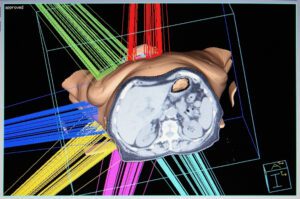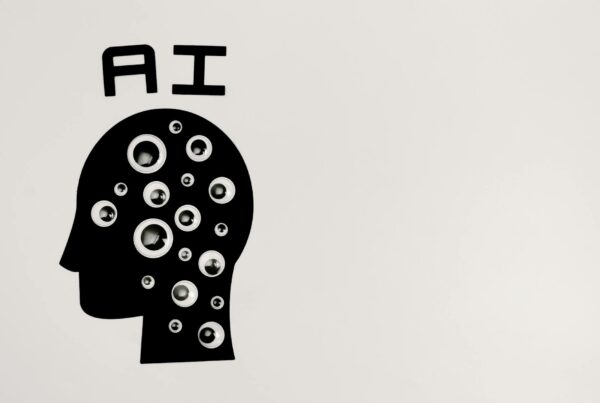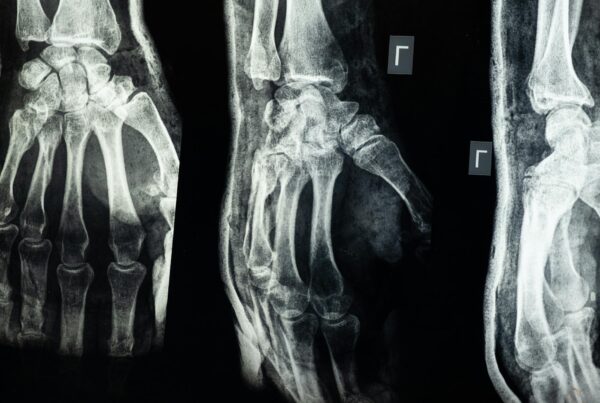I. Introduction
Radiotherapy is a treatment modality in cancer care that involves the use of high-energy radiation to destroy cancer cells. It is an important component of cancer care, often used in combination with other treatments such as chemotherapy and surgery.
Artificial intelligence (AI) is playing an increasingly important role in the field of medicine, and its integration into radiotherapy has the potential to revolutionize the way cancer is treated. AI tools have the potential to improve treatment planning, accuracy, and safety, leading to better patient outcomes.
ChatGPT is a cutting-edge AI tool developed by OpenAI that has the potential to make a significant impact

ChatGPT in Oncology
in the field of radiotherapy. ChatGPT uses advanced machine learning algorithms to analyze patient data and support radiation oncologists in making informed treatment decisions. By leveraging the power of AI, ChatGPT has the potential to revolutionize the practice of radiotherapy.
II. The Future of AI in Radiotherapy
AI is rapidly being integrated into clinical practice in the field of radiotherapy, and the future looks bright. There are several reasons why AI has the potential to revolutionize the practice of radiotherapy.
A. Rapid Integration into Clinical Practice:
AI tools are being rapidly adopted by radiation oncologists and therapists. They are being used to support and enhance the work of these professionals, helping them to make more informed treatment decisions.
B. Potential to Improve Efficiency, Accuracy, and Safety:
AI has the potential to improve treatment planning and optimization, leading to improved patient outcomes. It can also help predict treatment outcomes, providing valuable information to patients and their families. Additionally, AI has the potential to improve communication between patients and radiation oncologists, reducing the time and effort required for treatment delivery.
C. Bright Future for AI in Radiotherapy:
The potential of AI in radiotherapy is immense, and its impact on the field is only going to grow in the coming years. With continued advancements in technology and data analysis, the future looks bright for the integration of AI into radiotherapy. As a result, patients can expect to receive more efficient, accurate, and safe treatments in the future.
III. Benefits of AI in Radiotherapy
The integration of AI into radiotherapy offers several benefits, including improved treatment planning, better patient outcomes, and streamlined treatment delivery.
A. Improved Treatment Planning and Optimization:

Radiation Oncology Treatment
AI can support radiation oncologists in making informed treatment decisions by analyzing patient data and providing insights into the best treatment approach. This leads to improved treatment planning and optimization, resulting in better patient outcomes.
B. Better Prediction of Treatment Outcomes:
AI can be used to predict treatment outcomes, providing valuable information to patients and their families. This can help patients make informed decisions about their treatment, and it can also help radiation oncologists make more informed treatment decisions.
C. Improved Patient Communication and Education:
AI can be used to improve communication between patients and radiation oncologists. It can provide patients with information about their treatment and help them understand what to expect during the process. This leads to better patient education and engagement, which is critical for successful treatment outcomes.
D. Streamlined Treatment Delivery:
AI can help streamline the treatment delivery process by reducing the time and effort required for treatment delivery. This can lead to reduced treatment times, making the process more efficient and convenient for patients.
E. Reduced Treatment Times:

Appointments in the Oncology Information System
The use of AI in radiotherapy can lead to reduced treatment times, making the process more efficient and convenient for patients. By automating certain aspects of the treatment process, AI can help to streamline the delivery of radiotherapy, leading to faster and more effective treatments.
IV. The Role of AI in Radiation Oncology
AI plays an important role in radiation oncology, assisting in treatment planning, providing real-time guidance during treatment, and predicting and monitoring treatment outcomes.
A. Supporting and Enhancing the Work of Radiation Oncologists and Therapists:

Radiotherapy TPS
AI can support and enhance the work of radiation oncologists and therapists by providing insights into patient data and helping them make informed treatment decisions. This helps these professionals to provide the best possible care to their patients.
B. Assisting in Treatment Planning:
AI can assist radiation oncologists in making informed treatment decisions by analyzing patient data and providing insights into the best treatment approach. This leads to improved treatment planning and optimization, resulting in better patient outcomes.
C. Providing Real-Time Guidance During Treatment:
AI can provide real-time guidance during treatment, helping radiation oncologists to adjust treatment as needed. This leads to more precise and effective treatments, improving patient outcomes.
D. Predicting and Monitoring Treatment Outcomes:
AI can be used to predict treatment outcomes and monitor patient progress. This can provide valuable information to patients and their families and help radiation oncologists make more informed treatment decisions. Additionally, AI can help to identify potential complications early on, allowing for prompt intervention and better patient outcomes.
V. Machine Learning in Radiation Oncology
Machine learning plays an important role in radiation oncology, assisting in treatment planning, outcome prediction, and the analysis of large amounts of patient data.
A. Analyzing Large Amounts of Patient Data:
Machine learning algorithms are used to analyze large amounts of patient data, providing radiation oncologists with valuable insights into patient health and treatment outcomes. This information can be used to make informed treatment decisions, leading to better patient outcomes.
B. Improving Treatment Planning and Outcome Prediction:
Machine learning algorithms can be used to improve treatment planning and prediction of treatment outcomes. This helps radiation oncologists to make informed treatment decisions, leading to better patient outcomes.
C. Importance of Data Quality and Algorithmic Learning:
The quality of the data used to train machine learning algorithms is critical to the success of these algorithms. In addition, algorithms must be properly trained in order to provide accurate and useful information. Ensuring the quality of data and the proper training of algorithms is essential to the successful use of machine learning in radiation oncology.
VI. Why We Need AI in Radiotherapy
The use of AI in radiotherapy is becoming increasingly important as the demand for cancer care continues to grow and the complexity of treatment planning increases. AI can help to address these challenges, improving treatment times, accuracy, and decision making.
A. Addressing Increasing Demand for Cancer Care:
The demand for cancer care is increasing, putting pressure on healthcare systems to provide timely and effective treatments. AI can help to address this challenge by improving the efficiency and accuracy of treatment planning, allowing more patients to be treated in a timely manner.
B. Dealing with the Growing Complexity of Treatment Planning:
The complexity of treatment planning is growing, making it difficult for radiation oncologists to make informed decisions. AI can help to address this challenge by providing valuable insights into patient data and treatment outcomes, allowing radiation oncologists to make more informed treatment decisions.
C. Improving Treatment Times, Accuracy, and Decision Making:
AI can help to improve treatment times by streamlining the treatment planning and delivery process. Additionally, AI can improve the accuracy of treatment outcomes predictions and decision making, leading to better patient outcomes.
By addressing these challenges, AI has the potential to revolutionize the field of radiotherapy, making it more efficient, effective, and accessible to more patients.
VII. Disadvantages of AI in Radiotherapy
While AI has the potential to greatly improve the field of radiotherapy, there are also potential disadvantages that must be considered.
A. Potential for Errors in Data Analysis and Treatment Planning:
AI algorithms rely on data to make predictions and inform treatment decisions. If the data used to train these algorithms is inaccurate or if the algorithms are not properly trained, errors may occur in the analysis and treatment planning process.
B. Need for Continuous Monitoring and Maintenance:
AI algorithms require continuous monitoring and maintenance to ensure they are providing accurate and useful information. This can be time-consuming and costly, and can also require specialized expertise to perform.
C. Cost of Implementation:
The cost of implementing AI in radiotherapy can be substantial, including the cost of hardware, software, and personnel. Additionally, there may be ongoing costs for maintenance, monitoring, and updating the AI systems.
Despite these potential disadvantages, the benefits of AI in radiotherapy make it a valuable tool for radiation oncologists and therapists. However, careful consideration of these challenges and effective implementation strategies are necessary to ensure the successful use of AI in this field.
VIII. Accuracy of AI in Radiotherapy
The accuracy of AI in radiotherapy is dependent on several factors, including data quality and algorithmic learning.
A. Dependence on Data Quality and Algorithmic Learning:
AI algorithms rely on large amounts of patient data to make predictions and inform treatment decisions. If the data used to train these algorithms is inaccurate or if the algorithms are not properly trained, errors may occur in the analysis and treatment planning process. This highlights the importance of data quality and algorithmic learning in achieving accurate results with AI in radiotherapy.
B. Potential for High Accuracy with Proper Training and Validation:
With proper training and validation, AI has the potential to provide highly accurate results in radiotherapy. This includes accurate treatment planning, prediction of treatment outcomes, and real-time guidance during treatment. However, it is important to continuously monitor and validate the performance of AI algorithms to ensure they remain accurate over time.
Overall, the accuracy of AI in radiotherapy is largely dependent on the quality of the data used to train the algorithms and the effectiveness of the algorithmic learning. Proper training and validation can help to ensure accurate results and maximize the benefits of AI in this field.
IX. AI in Cancer Treatment
AI is a rapidly developing field with significant potential to revolutionize cancer care.
A. Definition and Purpose of AI in Cancer Treatment:
AI in cancer treatment refers to the use of artificial intelligence and machine learning algorithms to support and enhance the diagnosis, treatment, and management of cancer. The purpose of AI in cancer treatment is to improve the accuracy, efficiency, and accessibility of cancer care, while reducing the costs and improving the patient experience.
B. Potential to Revolutionize Cancer Care:
AI has the potential to revolutionize cancer care in several ways. This includes the ability to analyze large amounts of patient data to inform diagnosis and treatment decisions, the ability to provide real-time guidance during treatment, and the ability to predict and monitor treatment outcomes. The integration of AI into cancer care has the potential to improve the accuracy and efficiency of treatment, while also reducing the costs and improving the patient experience.
Overall, the use of AI in cancer treatment is a rapidly developing field with significant potential to revolutionize the way cancer is diagnosed, treated, and managed.
X. Conclusion
A. Recap of the Potential of ChatGPT in Radiotherapy
Radiotherapy is a critical component of cancer treatment and the integration of AI, such as ChatGPT, has the potential to revolutionize the field. From improved treatment planning and optimization to better prediction of treatment outcomes and reduced treatment times, the benefits of AI in radiotherapy are numerous.
B. Final Thoughts on the Future of AI in Radiotherapy
The future of AI in radiotherapy is bright, and ChatGPT is just one example of the advancements being made in the field. As AI continues to rapidly integrate into clinical practice, it will be crucial to address the potential disadvantages and ensure the accuracy of these technologies.
C. Call to Action for Further Exploration and Implementation of AI in the Field
The potential benefits of AI in radiotherapy are significant, and it is important to continue exploring and implementing these technologies in the field. This will require a collaborative effort between healthcare professionals, researchers, and technology experts to ensure the safe and effective integration of AI in radiotherapy.





